Celebrate Our Staff – September 2023
Join us as we celebrate our colleagues’ achievements across the University from the past few weeks.

Featured this month:
- Network for Black plant scientists secures funding to grow
- Fellowship to help researcher achieve decades-long ambition
- Yorkshire Gold for a campus in bloom
- New SharePoint will help academics meet competence standards requirements
- New book explores the genetics history that might have been
- Cultural studies lecturer to look at society’s technological future
- Book prize for social policy expert
- Major accreditation for professional development schemes
Network for Black plant scientists secures funding to grow

A network designed to support and celebrate Black plant scientists has been awarded £65,000 to grow its impact.
The Black in Plant Science network, co-founded by Dr Yoselin Benitez-Alfonso from the School of Biology, was initially launched with the support from Research Culture at the University of Leeds.
Now funded through the Gatsby Foundation, the network will connect, celebrate and cultivate Black and Afro-Caribbean researchers through face-to-face networking and mentoring opportunities and career workshops.
It will also support a dynamic and inclusive online community, with the aim of promoting the voices and achievements of past and current Black scientists.
Evidence suggests that UK-based Black plant scientists are often the sole Black employee in their department or organisation and the lack of community can be isolating, discouraging and lead to a loss of talent.
The network hopes to create opportunities where scientists can come together and share their lived experiences, aim to overcome this challenge, and foster an inclusive and supportive environment so that Black researchers can reach their full potential and feel a sense of belonging.
Yoselin said: “Creating a dynamic, diverse, and inclusive research system is not only ethically right but it also maximises research impact.
“However, the creation of inclusive environments where everyone can participate equally, where everyone’s voice matters and where everyone benefits comes with numerous challenges.”
The network was founded earlier this year by a group of Black scientists in both academia and industry and was established in response to the underrepresentation of UK based Black scientists in STEM.
Those interested can sign up to join the network.
Fellowship to help researcher achieve decades-long ambition
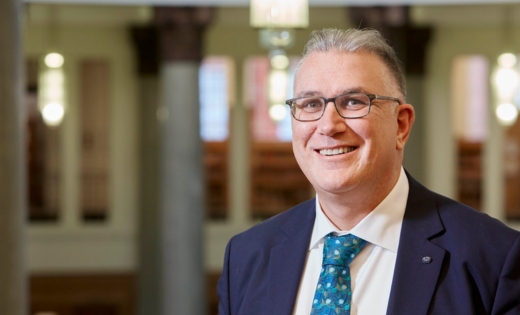
Professor Seán McLoughlin has been awarded a Leverhulme Trust Research Fellowship.
During his Fellowship, Seán, from the School of Philosophy, Religion and the History of Science, will write an open access monograph – a freely-available academic book – on British Muslims’ changing experiences of performing and organising the Hajj pilgrimage to Mecca in Saudi Arabia.
As long as they are fit and financially able, Hajj is an obligatory act of worship for Muslims once in their lifetime. Every year, around 2.5 million pilgrims re-enact the faith-testing ordeals of the Prophet Ibrahim (Abraham) and his family, believing that an ‘accepted Hajj’ will cleanse them of all their sins.
Seán said: “This fellowship will be the culmination of a research interest which began soon after I completed my PhD in the late 1990s. Researchers were thinking about migrants’ ongoing connections to people and places elsewhere. To me, the pilgrimage to Mecca stood out as perhaps the most emblematic expression of the idea of a globalised Islamic Ummah (community).
“However, virtually no research on the Hajj had been conducted among British Muslims who, it turns out, have been sending the largest number of western pilgrims to Mecca since the 1960s. Amongst other things, my book will explore how Britain’s four million Muslims have experienced the shift from independently organised travel in the 1990s to travel which must today be organised via Saudi-licensed online travel agencies.”
Seán has previously contributed to a major exhibition on the Hajj at the British Museum in 2012, ensuring that British Muslims’ experiences were included. He then authored the first report on the British Hajj travel industry which was launched at Parliament in 2019.
During his fellowship, Seán also plans to visit Saudi Arabia for the first time. Though as a non-Muslim he will not be able to enter Mecca itself, he hopes to meet with and learn from experts and practitioners seeking to improve information and services for pilgrims.
You can find out more about Seán’s work on the Leeds Hajj website.
Yorkshire Gold for a campus in bloom
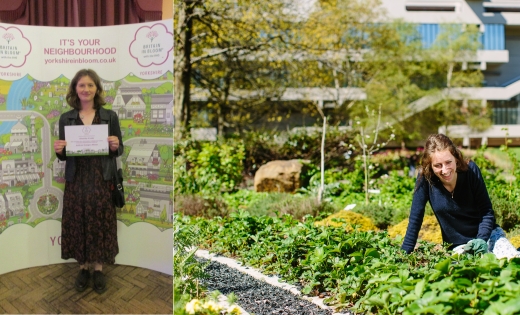
The University has come top in the Universities, College and Further Education category at this year’s Yorkshire in Bloom.
Thanks to the hard work of the Estates and Sustainability teams, the University achieved a Gold award for its variety of well-maintained planted areas around campus.
Every year, Yorkshire in Bloom – the regional branch of the Britain in Bloom awards – organises its annual competition encouraging schools, businesses and other community groups to create pleasant natural environments around them.
The award marks another successful year for the University in the Yorkshire in Bloom competition, having previously achieved Gold in 2017, 2019 and 2022, and Silver Gilt in 2018.
This year, the judges were very impressed by the volume of green space the University had to offer, as well as how it had been used for a mix of formal and informal planting areas.
Sustainability was also a major focus of the University’s submission, with a significant amount of interest paid to the Living Lab Sustainability Garden and the involvement of members of the University community in sustainability efforts around campus.
The judges also noted future plans for campus, including the creation of green walls on certain buildings and the development of seating areas around the Stage at Leeds building.
New SharePoint will help academics meet competence standards requirements
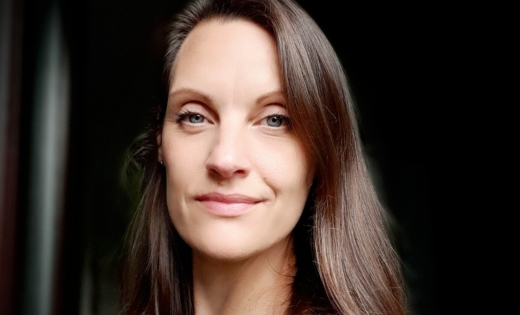
Harriet Cannon has taken the lead on creating a new site to help equip academics with the tools to make sure that their programme specifications now include competence standards, as defined under the Equality Act.
Harriet, the Disability Advisory Team Manager, developed and wrote the new SharePoint site to share important information about competence standards and how they link to disability and reasonable adjustments.
In the University context, competence standards are applied for the purposes of determining whether a person has a particular level of academic competence or ability.
Defining them is an important step towards ensuring that programmes are inclusive and recognise the diversity of the student body, as well as responding to the University’s legal duties under the Equality Act.
The new site will allow academics to develop their understanding of competence standards, as well as showing them how to write and review them – and how to meet their personal obligations under the law. The work sits within the Assessment strand of Curriculum Redefined and is part of a programme of training and development planned over the next academic year.
Harriet said: “This is an exciting, sector-leading, opportunity for everyone involved with teaching and assessing students to reflect on the core competence standards for each of our programmes, to provide clarity to students as to what is expected of them, and to ensure that the programmes we offer are inclusive.
“It brings together colleagues across academic departments and professional services, contributing directly to our University Vision & Strategy, our Equality and Inclusion Frameworks, and our Belonging and Student Success commitments.
“The Developing Competence Standards SharePoint site is a key tool in enabling colleagues to understand and contribute to this work, as part of a wider package of support and training over the coming months.”
New book explores the genetics history that might have been
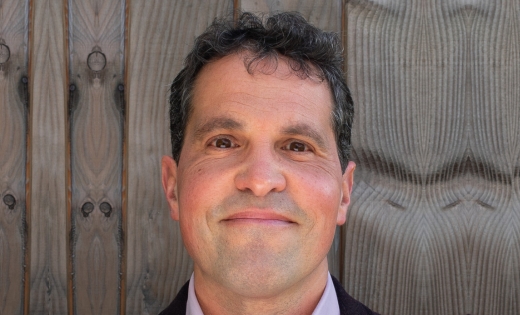
Professor Gregory Radick is the author of a new book which offers "a root-and-branch rethinking of how history has shaped the science of genetics."
In ‘Disputed Inheritance: The Battle over Mendel and the Future of Biology’, Greg, from the School of Philosophy, Religion and the History of Science, takes readers back to the early Twentieth Century beginnings of genetics, when a bitter feud raged over Gregor Mendel’s the pea-crossing experiments.
Mendel’s peas went on to become textbook biology, and the victory of the ‘Mendelians’ has come to seem a foregone conclusion – but it might not always have been the case.
Presenting a new history of the debate, Greg’s book reveals how close the other side – emphasising the modifying role of environments in genetics far more than Mendelians did – came to winning the argument and it considers the consequences of that “alternative history” for science and society.
The book has been reviewed in the journal Nature and the New Scientist magazine, among others, and praised for its perceptive analysis of the history of the field – as well as for providing a challenge to its commonly-held beliefs.
Greg said: “It’s a book that aims to show how opening up new options for understanding the scientific past can open up new options in the present and so, potentially, the future.
“Especially exciting to me is how enthusiastically the ideas are being taken up in the teaching of genetics, including here at Leeds.”
Greg will be speaking about ‘Disputed Inheritance’ at the Ilkley Literature Festival on 7 October and the Leeds Philosophical and Literary Society on 25 October. The book is published by the University of Chicago Press.
Cultural studies lecturer to look at society’s technological future
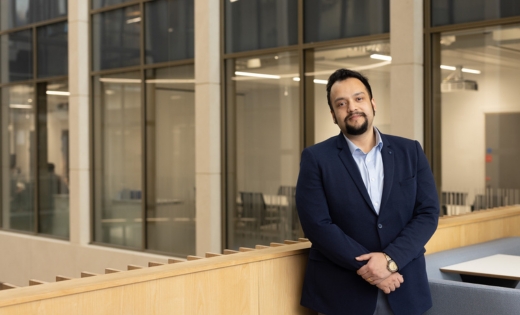
Dr Dibyadyuti Roy has been made an affiliate of Data & Society (D&S).
Dibya, from the School of Fine Art, History of Art and Cultural Studies and the Programme Director of the BA in Cultural and Media Studies, is one of 11 new affiliates who will work with D&S on their upcoming projects.
Data & Society is a US-based independent research institute which believes that how societies choose to design and govern technology will determine the future – something which could have major implications for the cause of equity worldwide.
Dibya is a lecturer in cultural studies, media studies, and digital humanities. His research and teaching explores the cultural narratives surrounding dominant technologies around us today, including nuclear weapons and artificial intelligence.
Dibya said: “I am humbled by this honour and look forward to building on my collaborative work with the Data & Society Research Institute that has previously allowed me to advise on and shape exciting projects including the anthology on ‘Parables of AI in/from the Majority World’ and the pedagogical resource titled ‘A Primer on AI in/from the Majority World’.”
He is also a founding member of India’s first digital humanities collective, the Digital Humanities Alliance for Research and Teaching Innovations (DHARTI), and will be facilitating conversations around “Critical AI” during the next year for the newly established Digital Creativity and Cultures Hub at the University of Leeds.
The D&S affiliates are a group of researchers, thinkers, and advocates who regularly work with the organisation. D&S values its relationships with outside collaborators as they work towards common goals.
Book prize for social policy expert
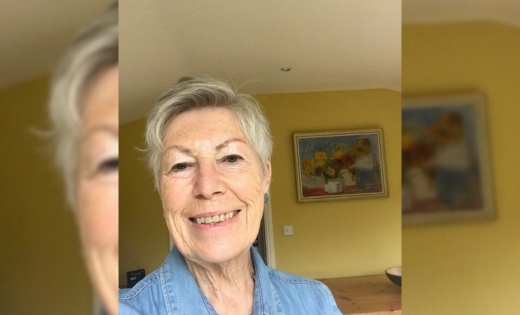
Emeritus Professor Fiona Williams OBE has been awarded the 2023 Peter Townsend Prize.
Professor Williams, from the School of Sociology and Social Policy, was jointly awarded the prize for her book ‘Social Policy – A Critical and Intersectional Analysis’.
The Peter Townsend Prize recognises excellence in the humanities and social sciences and celebrates academics whose accomplishments have helped shape the understanding of our world.
It is awarded by the British Academy in memory of Peter Townsend, a global figure in sociology and social policy whose work in areas such as poverty and inequality made a large contribution to analysis and policymaking in the field.
‘Social Policy’ looks at how welfare states have fared in light of the COVID-19 pandemic, austerity and ethnonationalism.
Fiona said: “It’s a huge and unexpected honour to receive this prize. Peter Townsend was a towering figure in social policy and a campaigner for social justice for those marginalised and excluded by poverty and inequality.
“His critiques of post-war governments’ complacency to these issues were formative in my own learning and activism.”
In the book, Fiona argues that we need to look at global challenges to better understand how welfare states have fared during a decade of austerity.
It also looks at what social justice movements including Black Lives Matter and Extinction Rebellion might be able to tell us about the future of how we look after one another.
Fiona will be officially awarded the medal in a ceremony in London on 11 October.
Major accreditation for professional development schemes

Two teams at the University have recently been accredited by Advance HE for their professional development programmes.
The Student Education Development team, within the Organisational Development & Professional Learning Department, and the Postgraduate Certificate in Clinical Education team in Leeds Institute for Medical Education have recently been awarded accreditation for three schemes.
The accreditation for the Professional Recognition in Student Education (PRiSE), Postgraduate Certificate in Academic Practice (PGCAP) and the Postgraduate Certificate in Clinical Education is a ‘badge of quality’ recognised nationally.
The teams – which include Victoria Taylor, Rebecca O'Loughlin, Rachel Haworth, Kate Richardson, Aline Gaus, Kate Exley, Jane Dalton, Ruth Allcroft, Susan Donkin, Barbara MacPherson and Maureen Brennan – had to put in a large amount of work to demonstrate how the programmes meet Advance HE’s professional standards framework.
Reflecting on the accreditation, Jane Dalton, Head of Student Education Development said the feedback from Advance HE was really positive and included that “the University of Leeds are one of the first universities to be accredited against the Professional Standards Framework 2023.
“It demonstrates your commitment to the professional development of staff and use of Fellowship to support strategic priorities around learning and teaching. In addition to showing the University’s commitment to the career development framework, the accreditation also shows a clear commitment to the enhancement of teaching and learning at the University.”
Get in touch!
We know there are lots of great things happening to support the work of the University – and we want to hear about them!
Please follow the staff Twitter account to see the latest updates and copy in our @UniLeedsStaff handle when posting success stories, so we can share them with colleagues.
You can also contact Internal Communications and Engagement directly at internalcomms@leeds.ac.uk if you or one of your colleagues would like to appear in this monthly feature. This is open to all staff – professional and academic.
Posted in: All Staff EmailUniversity news